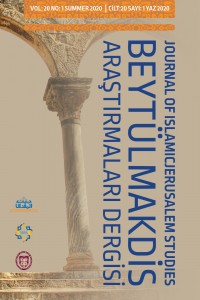The Heads of the Islamic Supreme Committee in Bay al-Maqdis leading the Resistance against the Occupation: Sheikh Dr. Akrama Sabri as a model
Abstract
Israel was forcibly established as an artificial entity occupying an area of 78% of Palestine in the year 1948, and attempted to exterminate the Palestinian people as well as their memory and civilization. This entity was built at the expense of other people, 85% of whom were displaced. In June 1967, Israel launched a war that resulted in its occupation of the remainder of Palestine. After two days of fighting, Israeli occupation forces entered the eastern part of the city of Jerusalem, which had been under Jordanian rule since the Nakba of 1948. In compliance with the provisions of Islamic jurisprudence which dictate that Muslims should manage their own religious affairs, a group of Muslim scholars and countrymen issued a historic statement on 24 July 1967 and announced the formation of The Islamic Supreme Committee in Bayt al-Maqdis, which would assume control of the Awqaf, Islamic Affairs and Holy Sites, and would supervise the Sharia courts, and which included the Restoration Committee of Al-Aqsa Mosque and the Dome of the Rock. Since its inception, the Islamic Supreme Committee functioned as an independent Islamic body based in Jerusalem led by jurists, muftis, politicians, lawyers, and other respected personalities. The first chairmen of the Committee was the late Sheikh Abdul Hamid Al-Sayeh, who stayed in office for only two months as the occupation authorities deported him to Jordan. He was succeeded by a number of Jerusalemite scholars until the current president, Sheikh Dr. Ikrima Saeed Sabri, held this office in 1998. This study finds that establishing the Committee was a real challenge to the occupation’s forces and has spoiled much of their plans. The Committee was also established as an important player in matters related to Jerusalem and Palestine in general. This study sheds particular light on the period in which Sheikh Dr. Ikrima Sabri led the Committee since 1998. This was a period that has been very critical for the region, witnessing the Oslo accords and the Wye River negotiations, the second intifada in 2000, the martyrdom of Yasser Arafat, a historic Leader of the Palestinian people in 2004, as well as major international events such as the invasion of Iraq. In these circumstances, Jerusalem witnessed a higher level of aggressiveness from the occupiers, who have rejected all international agreements and treaties and is moving towards Judaising the city and eliminating its Arab and Islamic identity dating back to time immemorial. This has required the Supreme Islamic Committee and its chairmen to fully carry out their historic responsibilities, requiring vigilance and vigorous follow-up, which has in turn created a situation of direct clash with the occupation forces as they begin to monitor all its activities and who seek from time to time to restrict it at various levels
Keywords
The Islamic Supreme Committee Bayt al-Maqdis Jerusalem Judaisation Zionist Occupation Resistance
Supporting Institution
Al-Quds University
Project Number
1
References
- BenZiman, Uzi. Bayt al-Maqdis madina bila Aswar. Tr.M.Madi. Bayt al-Maqdis:Wakalat Abu-Arafa lil-Sahafa, 1967.
- Al-Khatib, Anwar. Ma‘ Salah al-Din fi Bayt al-Maqdis- Ta’amulat wa Zikrayat. Bayt al-Maqdis: Dar al-Tiba‘ah al-Arabiyah, 1989.
- Al-Sa’ih, Abdulhamid. Filistin, Laa Salah tahta al-Hirab. Beirut: Mu’asast al-Dirast al-Filistiniyah, 2001.
- Sabri, Akrama, and Assa, Aziz. Al-Hay’a al-Islamiyah bi-Bayt al-Maqdis: Sahwa Mubakira fi Muwajahat al-Ihtilal fi aamay 1967 wa 1968 Unmuzajan. Amman: Jordan University, li-mu’tamar Bayt al-Maqdis: Tahadiyat al-Waqi‘ wa imkaniyat al-Muwajaha, 2019.
- Sabri, Akrama. Sirah Zatiyah: Mahtat min Siyreti, 2018 (not published).
- Sabri, Akrama. “Adwa’ ‘ala al-Hay’a al-Islamiyah al-Ulya”, Nashrat Sawt al-Hay’a. Bayt al-Maqdis: al-Hay’a al-Islamiyah al-Ulya bi-Bayt al-Maqdis, 2013.
- Sabri, Akrama. Fakid al-Ummah al-Marhum al-Shaikh Sa‘id Abdullah Sabri. Jerusalem: Matbat Dar al-Aytam bi-Bayt al-Maqdis, 1974.
- Al-Alami, Sa‘d al-Din. Wathaiq al-Hay’a al-Islamiyah al-Ulya bi-Bayt al-Maqdis 24-7-1967 ila 31-12-1984. Bayt al-Maqdis: Dar al-Tiba‘a al-Arabiyah, 1984.
- Annab, M.R. Bayt al-Maqdis fi Mashari‘ al-Taswiyah al-Siyasiyah. N.p.: Dar al-Shayma’ lil-Nashir wal-Tawzee‘, 2012.
- Ghanim, H. “al-Siyasah al-Hayawiyah lil-Isti‘mar al-Istitani, Intaj al-Maqdisiyin ka-Mariqin”, Majalat Qadaya Israiliyah. Vol.47, pp.94-108.
- Mu’asast al-Aqsa li-Imar al-Muqadasat al-Islamiyah, Et al. Inna Baqun, Nakbat Harat al-Maghariba fi Suwar, Arbaun Aman tahta al-Ihtilal al-Israili. Umm al-Fahm: Mu’asast al-Aqsa li-Imar al-Muqadasat al-Islamiyah, 2007. https://dspace.qou.edu/contents/0104/unit6/resources/pdf.pdf
- Mawsu‘at al-Jazeera (al-Jazeera Encycopedia): http://www.aljazeera.net/encyclopedia/citiesandregions/2017/3/11/أرقام-وحقائق-عن-البلدة-القديمة-ببيت المقدس
- Al-Mustawtanat al-Israiliya wa-Atharutha al-Iqtisadiyah wal-Ijtima‘iyah ‘ala al-Aradi al-Filistiniyah wa-Qita‘ al-‘Amal. Palestine: Wazarat al-‘Amal al-Filistiniyah, 2017: http://info.wafa.ps/pdf/i_s_e_s_e_p.pdf
Abstract
Project Number
1
References
- BenZiman, Uzi. Bayt al-Maqdis madina bila Aswar. Tr.M.Madi. Bayt al-Maqdis:Wakalat Abu-Arafa lil-Sahafa, 1967.
- Al-Khatib, Anwar. Ma‘ Salah al-Din fi Bayt al-Maqdis- Ta’amulat wa Zikrayat. Bayt al-Maqdis: Dar al-Tiba‘ah al-Arabiyah, 1989.
- Al-Sa’ih, Abdulhamid. Filistin, Laa Salah tahta al-Hirab. Beirut: Mu’asast al-Dirast al-Filistiniyah, 2001.
- Sabri, Akrama, and Assa, Aziz. Al-Hay’a al-Islamiyah bi-Bayt al-Maqdis: Sahwa Mubakira fi Muwajahat al-Ihtilal fi aamay 1967 wa 1968 Unmuzajan. Amman: Jordan University, li-mu’tamar Bayt al-Maqdis: Tahadiyat al-Waqi‘ wa imkaniyat al-Muwajaha, 2019.
- Sabri, Akrama. Sirah Zatiyah: Mahtat min Siyreti, 2018 (not published).
- Sabri, Akrama. “Adwa’ ‘ala al-Hay’a al-Islamiyah al-Ulya”, Nashrat Sawt al-Hay’a. Bayt al-Maqdis: al-Hay’a al-Islamiyah al-Ulya bi-Bayt al-Maqdis, 2013.
- Sabri, Akrama. Fakid al-Ummah al-Marhum al-Shaikh Sa‘id Abdullah Sabri. Jerusalem: Matbat Dar al-Aytam bi-Bayt al-Maqdis, 1974.
- Al-Alami, Sa‘d al-Din. Wathaiq al-Hay’a al-Islamiyah al-Ulya bi-Bayt al-Maqdis 24-7-1967 ila 31-12-1984. Bayt al-Maqdis: Dar al-Tiba‘a al-Arabiyah, 1984.
- Annab, M.R. Bayt al-Maqdis fi Mashari‘ al-Taswiyah al-Siyasiyah. N.p.: Dar al-Shayma’ lil-Nashir wal-Tawzee‘, 2012.
- Ghanim, H. “al-Siyasah al-Hayawiyah lil-Isti‘mar al-Istitani, Intaj al-Maqdisiyin ka-Mariqin”, Majalat Qadaya Israiliyah. Vol.47, pp.94-108.
- Mu’asast al-Aqsa li-Imar al-Muqadasat al-Islamiyah, Et al. Inna Baqun, Nakbat Harat al-Maghariba fi Suwar, Arbaun Aman tahta al-Ihtilal al-Israili. Umm al-Fahm: Mu’asast al-Aqsa li-Imar al-Muqadasat al-Islamiyah, 2007. https://dspace.qou.edu/contents/0104/unit6/resources/pdf.pdf
- Mawsu‘at al-Jazeera (al-Jazeera Encycopedia): http://www.aljazeera.net/encyclopedia/citiesandregions/2017/3/11/أرقام-وحقائق-عن-البلدة-القديمة-ببيت المقدس
- Al-Mustawtanat al-Israiliya wa-Atharutha al-Iqtisadiyah wal-Ijtima‘iyah ‘ala al-Aradi al-Filistiniyah wa-Qita‘ al-‘Amal. Palestine: Wazarat al-‘Amal al-Filistiniyah, 2017: http://info.wafa.ps/pdf/i_s_e_s_e_p.pdf
Abstract
Project Number
1
References
- BenZiman, Uzi. Bayt al-Maqdis madina bila Aswar. Tr.M.Madi. Bayt al-Maqdis:Wakalat Abu-Arafa lil-Sahafa, 1967.
- Al-Khatib, Anwar. Ma‘ Salah al-Din fi Bayt al-Maqdis- Ta’amulat wa Zikrayat. Bayt al-Maqdis: Dar al-Tiba‘ah al-Arabiyah, 1989.
- Al-Sa’ih, Abdulhamid. Filistin, Laa Salah tahta al-Hirab. Beirut: Mu’asast al-Dirast al-Filistiniyah, 2001.
- Sabri, Akrama, and Assa, Aziz. Al-Hay’a al-Islamiyah bi-Bayt al-Maqdis: Sahwa Mubakira fi Muwajahat al-Ihtilal fi aamay 1967 wa 1968 Unmuzajan. Amman: Jordan University, li-mu’tamar Bayt al-Maqdis: Tahadiyat al-Waqi‘ wa imkaniyat al-Muwajaha, 2019.
- Sabri, Akrama. Sirah Zatiyah: Mahtat min Siyreti, 2018 (not published).
- Sabri, Akrama. “Adwa’ ‘ala al-Hay’a al-Islamiyah al-Ulya”, Nashrat Sawt al-Hay’a. Bayt al-Maqdis: al-Hay’a al-Islamiyah al-Ulya bi-Bayt al-Maqdis, 2013.
- Sabri, Akrama. Fakid al-Ummah al-Marhum al-Shaikh Sa‘id Abdullah Sabri. Jerusalem: Matbat Dar al-Aytam bi-Bayt al-Maqdis, 1974.
- Al-Alami, Sa‘d al-Din. Wathaiq al-Hay’a al-Islamiyah al-Ulya bi-Bayt al-Maqdis 24-7-1967 ila 31-12-1984. Bayt al-Maqdis: Dar al-Tiba‘a al-Arabiyah, 1984.
- Annab, M.R. Bayt al-Maqdis fi Mashari‘ al-Taswiyah al-Siyasiyah. N.p.: Dar al-Shayma’ lil-Nashir wal-Tawzee‘, 2012.
- Ghanim, H. “al-Siyasah al-Hayawiyah lil-Isti‘mar al-Istitani, Intaj al-Maqdisiyin ka-Mariqin”, Majalat Qadaya Israiliyah. Vol.47, pp.94-108.
- Mu’asast al-Aqsa li-Imar al-Muqadasat al-Islamiyah, Et al. Inna Baqun, Nakbat Harat al-Maghariba fi Suwar, Arbaun Aman tahta al-Ihtilal al-Israili. Umm al-Fahm: Mu’asast al-Aqsa li-Imar al-Muqadasat al-Islamiyah, 2007. https://dspace.qou.edu/contents/0104/unit6/resources/pdf.pdf
- Mawsu‘at al-Jazeera (al-Jazeera Encycopedia): http://www.aljazeera.net/encyclopedia/citiesandregions/2017/3/11/أرقام-وحقائق-عن-البلدة-القديمة-ببيت المقدس
- Al-Mustawtanat al-Israiliya wa-Atharutha al-Iqtisadiyah wal-Ijtima‘iyah ‘ala al-Aradi al-Filistiniyah wa-Qita‘ al-‘Amal. Palestine: Wazarat al-‘Amal al-Filistiniyah, 2017: http://info.wafa.ps/pdf/i_s_e_s_e_p.pdf
Details
| Primary Language | Arabic |
|---|---|
| Journal Section | Articles |
| Authors | |
| Project Number | 1 |
| Publication Date | June 30, 2020 |
| Published in Issue | Year 2020 Volume: 20 Issue: 1 |
ISSN:1367-1936, e-ISSN:2514-6009







